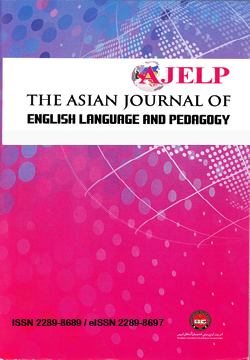The effect of focused and comprehensive written corrective feedback on writing accuracy: A comparative study
DOI:
https://doi.org/10.37134/ajelp.vol11.1.9.2023Keywords:
comprehensive written corrective feedback, English as a Foreign Language, focused written corrective feedback, writing accuracyAbstract
Although a vast body of research has investigated the effectiveness of written corrective feedback on students’ writing accuracy, there is relatively fewer studies that compared the effectiveness of focused and comprehensive written corrective feedback. Determining the relative efficacy of feedback focus is crucial for writing instruction as it can make error correction less tedious for the teacher and more manageable for the learner. Writing teachers need to know whether students can better internalize a selected number of error categories at a time or cope with feedback provided on all errors simultaneously. This research reports a quantitative study that compared the effectiveness of focused and comprehensive corrective feedback on Saudi Arabia English as a Foreign Language (EFL) learners’ essay writing accuracy. Written essays were collected from 18 Foundation Year, Health Sciences students where they were divided into two experimental groups (N=6) and one control group (N=6). A pre-test, post-test, and delayed post-test design was employed to measure the effects of the two types of written corrective feedback on learners’ writing accuracy. The results showed that focused written corrective feedback was not significantly more effective than comprehensive written corrective feedback although it caused lower error means on both the selected error categories as well as on total errors. The results suggest that students and teachers need not view the two types of feedback as mutually exclusive as far as their relative effectiveness is concerned.
Downloads
References
Bitchener, J. (2008). Evidence in support of written corrective feedback. Journal of Second Language Writing, 17(2), 102–118. https://doi.org/10.1016/j.jslw.2007.11.004
Bonilla Lopez, M., Van Steendam, E., Buyse, K., & Speelman, D. (2021). Comprehensive corrective feedback in foreign language writing: The response of individual error categories. Journal of Writing Research, 13(1), 31–70. https://doi.org/10.17239/jowr-2021.13.01.02
Crosthwaite, P., Ningrum, S., & Lee, I. (2022). Research trends in L2 written corrective feedback: A bibliometric analysis of three decades of Scopus-indexed research on L2 WCF. Journal of Second Language Writing, 58, 100934. https://doi.org/10.1016/j.jslw.2022.100934
Ellis, R., Sheen, Y., Murakami, M., & Takashima, H. (2008). The effects of focused and unfocused written corrective feedback in an English as a foreign language context. System, 36(3), 353–371. https://doi.org/10.1016/j.system.2008.02.001
Ferris, D. (1999). The case for grammar correction in L2 writing classes: A response to Truscott (1996). Journal of Second Language Writing, 8(1), 1–11. https://doi.org/10.1016/S1060-3743(99)80110-6
Ferris, D. (2011). Treatment of Error in Second Language Student Writing, Second Edition. University of Michigan Press.
Ferris, D. R. (1995). Student Reactions to Teacher Response in Multiple-Draft Composition Classrooms. TESOL Quarterly, 29(1), 33–53. https://doi.org/10.2307/3587804
Frear, D., & Chiu, Y. (2015). The effect of focused and unfocused indirect written corrective feedback on EFL learners’ accuracy in new pieces of writing. System, 53, 24–34. https://doi.org/10.1016/j.system.2015.06.006
Greenhouse, S. W., & Geisser, S. (1959). On methods in the analysis of profile data. Psychometrika, 24(2), 95-112.
Hyland, K. (2003). Second Language Writing. Cambridge University Press. https://doi.org/10.1017/CBO9780511667251
Li, S., & Vuono, A. (2019). Twenty-five years of research on oral and written corrective feedback in System. System, 84, 93–109. https://doi.org/10.1016/j.system.2019.05.006
Mao, Z., & Lee, I. (2020). Feedback scope in written corrective feedback: Analysis of empirical research in L2 contexts. Assessing Writing, 45, 100469. https://doi.org/10.1016/j.asw.2020.100469
Polio, C. G. (1997). Measures of Linguistic Accuracy in Second Language Writing Research. Language Learning, 47(1), 101–143. https://doi.org/10.1111/0023-8333.31997003
Rahimi, M. (2019). A comparative study of the impact of focused vs. Comprehensive corrective feedback and revision on ESL learners’ writing accuracy and quality. Language Teaching Research, 25(5), 687–710. https://doi.org/10.1177/1362168819879182
Sheen, Y., Wright, D., & Moldawa, A. (2009). Differential effects of focused and unfocused written correction on the accurate use of grammatical forms.
Truscott, J. (1996). The Case Against Grammar Correction in L2 Writing Classes. Language Learning, 46(2), 327–369.
Downloads
Published
How to Cite
Issue
Section
License
Copyright (c) 2023 Arshad Iqbal, Mohammad Azannee Saad

This work is licensed under a Creative Commons Attribution-NonCommercial-ShareAlike 4.0 International License.





